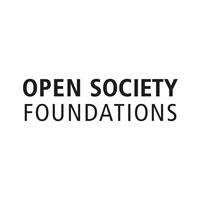Kerala 2010
Event 1
Events taking place live online 5–9 October 2023
Jonathan Franzen and Andrey Kurkov in conversation with Charlotte Higgins (digital event)
Read moreWhen the first Russian rockets fell on Kyiv on February 24 2022, novelist, essayist and writer Andrey Kurkov started keeping a diary. His entries – providing a first-hand account of what it’s like to live through an active conflict – were published in the book Diary of an Invasion. Kurkov’s writing chronicles the terrible impact of the conflict through his personal experiences, giving an intimate look at Ukrainian identity and the day-to-day lives of his fellow citizens. He and Jonathan Franzen – author of six novels including The Corrections, and five works of nonfiction – discuss their work, the role of literature during war, and the responsibility of the artist in times of conflict. Chaired by the Guardian’s chief culture writer Charlotte Higgins.
Closed captions are available for this event in English and Spanish. Click on the "cc" icon in the video frame to select.

Event 2
Events taking place live online 5–9 October 2023
Kateryna Kalytko and Ozren Kebo (digital event)
Guerra para principiantes
Read moreCan books about past wars prepare for future wars? Conversation about the similarities and differences between the war in the Balkans and Russia's war against Ukraine. About this in a conversation between Bosnian writer Ozren Kebo and Ukrainian writer and translator from Bosnian Kateryna Kalytko.

Event 3
Events taking place live online 5–9 October 2023
Uilleam Blacker, Georgi Gospodinov (digital) and Ostap Slyvynsky in conversation with Katherine Younger
Remembering Our Way to the Future
Read more“It's been written that the past is a foreign country. Nonsense. The past is my home country. The future is a foreign country, full of strange faces, I won't set foot there,” says the narrator of Time Shelter, the 2023 International Booker Prize winning novel by Bulgarian writer Georgi Gospodinov (he will join remotely). Hopelessness about the future feeds the beasts of the past. The violent consequences of this turn are all too obvious: Russia is waging “a war not only for territory, but also for time,” as Gospodinov has put it, seeking to drag Ukraine and Ukrainians into a warped vision of the past.
But it is precisely Ukrainians’ commitment to and hope in the future that sustains them in their fight, bolstered by the memory of generations past. Can memory serve as an antidote to invented histories, thereby “holding the past at bay”? How can the stories we tell and read shape our understanding? Georgi Gospodinov, writer and translator Ostap Slyvynsky, and literary scholar and translator Uilleam Blacker speak with historian Katherine Younger about our stories and dreams of the past and memory's role in shaping the future.
Closed captions are available for this event in English and Spanish. Click on the "cc" icon in the video frame to select.
In collaboration with the Institute for Human Sciences (IWM Vienna)
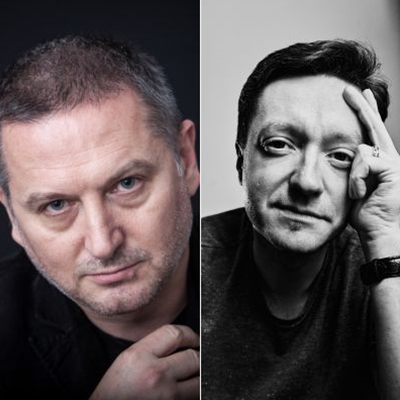
Event 4
Events taking place live online 5–9 October 2023
Anne Applebaum (digital), Slavenka Drakulich (digital), Vakhtang Kebuladze and Maksym Yakovliev, chaired by Tetiana Oharkova
War as the collapse of civilization: can there be happiness after war?
Read moreHow do we define when a war is won? Is it simply victory on the battlefield? A return of territory and lives saved? Or does victory also include the more intangible, such as the protection of our humanity and trust in the world, and the ability to still feel happiness and love in the aftermath of tragedy and trauma?
Philosopher, writer and translator Vakhtang Kebuladze, journalists Slavenka Drakulich (she will join remotely) and Anne Applebaum (she will join remotely), and Maksym Yakovliev look at what happens after war is over. They talk to the journalist and essayist Tetiana Oharkova about how we should communicate with people who have survived war, whether it’s possible to feel happiness after trauma, and whether wars represent new beginnings.
Closed captions are available for this event in English and Spanish. Click on the "cc" icon in the video frame to select.

Event 5
Events taking place live online 5–9 October 2023
Timothy Garton Ash, Emma Graham-Harrison, Oleksandra Matviichuk (digital), Sevgil Musaeva and Oleksandr Sushko, chaired by Kristina Berdinskikh
Marshall Plan for Ukraine: what future awaits the world after the Ukrainian victory
Read moreIn 1948, the United States of America enacted the Marshall Plan, an initiative to provide foreign aid to Western Europe to help it recover after the Second World War, and to boost the world economy. A panel of experts discuss how a modern version of the Marshall Plan from countries across the world is needed in the wake of the war in Ukraine.
The war has, and will continue to have, long-reaching and long-lasting effects outside the borders of the country economically. Historian Timothy Garton Ash, journalists Emma Graham-Harrison and Sevgil Musaeva, human rights lawyer Oleksandra Matviichuk (she will join remotely) and Oleksandr Sushko, Research Director at the Institute for Euro-Atlantic Cooperation in Kyiv and member of the Maidan People's Union council examine how the war is affecting money, investment and more. From looking at the long-term dangers of a peace on Russian terms to what Ukraine has to offer to the world and what can be done to communicate Ukraine's economic potential, the group will argue that supporting Ukraine's reconstruction and the full restoration of Ukraine's sovereignty and territorial integrity can stabilise global food and energy markets. Journalist Kristina Berdinskikh chairs.
Closed captions are available for this event in English and Spanish. Click on the "cc" icon in the video frame to select.
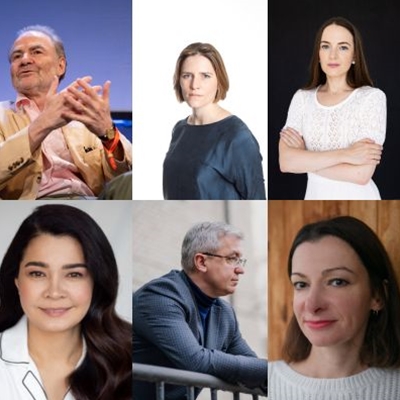
Event 6
Events taking place live online 5–9 October 2023
Ukrainian Jewish Encounter Prize Ceremony
Read moreEncounter: The Ukrainian-Jewish Literary Prize ™ is designed to be based on the common centuries-old experience of Ukrainians and Jews, which has found expression in fiction and non-fiction literature. The prize is awarded annually for the most influential work of fiction and non-fiction (in 2023 - fiction) that promotes Ukrainian-Jewish understanding, helping to strengthen the position of Ukraine as a multi-ethnic society and embodying the motto "Our stories are incomplete without each other". The award ceremony will be held with the participation of Ukrainian writer Sofia Andrukhovych, whose novel Amadoka won the 2023 prize; Marjana Savka, editor-in-chief of The Old Lion Publishing House; Olha Mukha, curator of congresses, committees and new centers of PEN International; Oksana Forostyna, Co-founder at Yakaboo Publishing, editor, translator and writer; Natalia Feduschak, communication director of the Ukrainian Jewish Encounter.

Event 7
Events taking place live online 5–9 October 2023
Conversation between Volodymyr Arenev and Jonathan Stroud (digital)
Read moreThis year it turns 10 years since Lockwood & Co was published. Meet Jonathan Stroud (he will join remotely), the author of the cult text. The moderator of the conversation is Volodymyr Arenev, a Ukrainian fiction writer.
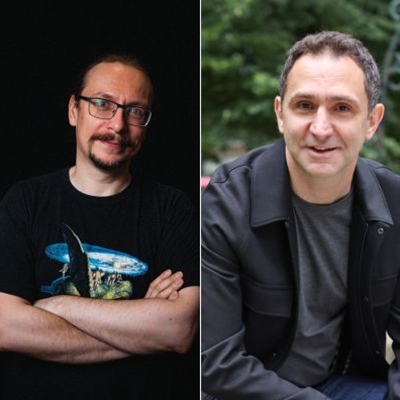
Event 14
Events taking place live online 5–9 October 2023
Jaroslava Barbieri, Janine di Giovanni, Ian Garner (digital) and Sofi Oksanen (digital), chaired by Peter Pomerantsev
Freedom of thoughts vs indoctrination
Read moreHow do you take a whole group of people, destroy their identity and force a new one on them? That is Russia’s aim in Ukraine. What methods do they use; does it work, and how does it compare to other examples across the world and in history?
Ian Garner and Sofi Oksanen will join remotely.

Event 9
Events taking place live online 5–9 October 2023
Elif Batuman, Kateryna Kalytko, Taras Prokhasko, David Toscana (digital) and Iryna Tsilyk, chaired by Sasha Dovzhuk
Existential resilience: how global historical changes affect who we are
Read moreThrough the war with Russia, Ukraine has emerged as an unexpected hero in a battle for freedom in Europe – a battle few could have predicted. The conflict has led many, inside and outside of the continent, to rethink the political and moral ideas that we have taken for granted since the Second World War ended.
Using literature and the ways in which it helps us make sense of critical points in history and how colossal changes affect people's ways of thinking and feeling, a panel discusses ideas of heroism and how literature can help these sceptics of Ukraine understand its quests and feats. Novelist Elif Batuman, writer Kateryna Kalytko, filmmaker Iryna Tsilyk, writer David Toscana (he will join remotely) and novelist Taras Prokhasko will also talk to writer Sasha Dovzhuk about how literature can help people feel with Ukrainians and learn from the mistakes of the past.
Closed captions are available for this event in English and Spanish. Click on the "cc" icon in the video frame to select.

Event 10
Events taking place live online 5–9 October 2023
Emma Antoniuk, Vakhtang Kebuladze and Peter Pomerantsev, chaired by Olena Huseinova
Modern Mythologies: do we still need heroes in the 21st century?
Read moreThe creation of heroic narratives has been widespread in art and literature across time and cultures. This panel will explore how we mythologize in the modern world, what stories we expect, and whether heroes still satisfy our aesthetic sensitivity in the 21st century.
Emma Antoniuk, philosopher and writer Vakhtang Kebuladze and journalist Peter Pomerantsev explore how we mythologize in the modern world, what stories we expect, and whether heroes still satisfy our aesthetic sensitivity in the 21st century. Chaired by poet Olena Huseinova.

Event 11
Events taking place live online 5–9 October 2023
Pankaj Mishra (digital) and Volodymyr Yermolenko, chaired by Sevgil Musaieva
The art of decolonization
Read moreIndian essayist Pankaj Mishra joins Ukrainian philosopher Volodymyr Yermolenko to explore the ways Russia's assault on Ukraine has forced Europe to confront its colonial past and present. Chaired by Ukrainian journalist Sevgil Musaieva.
Bektour Iskender and Panjak Mishra will join remotely
Closed captions are available for this event in English and Spanish. Click on the "cc" icon in the video frame to select.
The event is in partnership with Ukrainska Pravda.
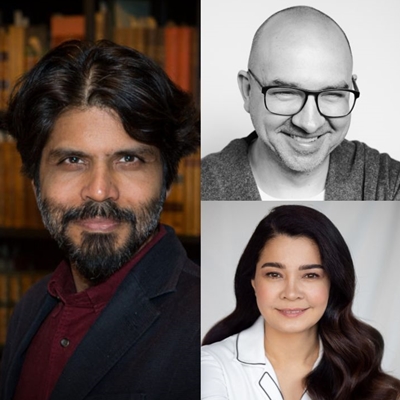
Event 12
Events taking place live online 5–9 October 2023
Rachel Clarke, Halyna Kruk and Ben Okri (digital) in conversation with Olesia Khromeichuk
The Power of Words
Read moreWords have immense power, and in times of difficulty they can encourage, inspire and offer hope, helping shape thoughts, emotions and actions. Writers Ben Okri (he will join remotely), Rachel Clarke and Halyna Kruk talk to historian Olesia Khromeichuk about the power of books and writing in conflicted times.
Okri a Nigerian-born British poet and novelist considered one of the foremost African authors in the post-modern and post-colonial traditions; he won the Booker Prize for his novel The Famished Road in 1991. Clarke a British palliative care doctor and writer and formerly a current affairs journalist. Kruk is a Ukrainian writer, translator, educator and literary critic.
Closed captions are available for this event in English and Spanish. Click on the "cc" icon in the video frame to select.
This event is in collaboration with Book Aid International, a non-profit organisation that creates access to books.
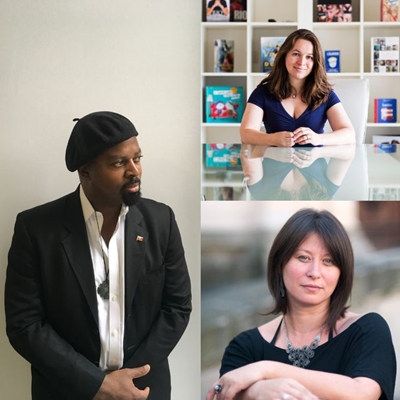
Event 8
Events taking place live online 5–9 October 2023
How the Maidan Revolution changed us
Read moreThe Maidan Revolution - or Revolution of Dignity - took place in Ukraine in February 2014 at the end of the Euromaidan protests. Deadly clashes between protesters and state forces in the capital Kyiv culminated in the ousting of elected President Viktor Yanukovych and a return to the 2004 Constitution. An expert panel of contributors explores its significance as a turning point in Ukrainian history. With Kateryna Kalytko, Vitalii Portnykov and Antin Borkovski.

Event 16
Events taking place live online 5–9 October 2023
Yaryna Chornohuz, Luke Harding, Svitlana Povaliaeva and David Rieff, chaired by Tetyana Ogarkova
Fighting for or with words? The challenges of speaking about war
Read moreWar can both engender clamour and silence. Some people feel it imperative to talk about every life lost and every building destroyed, channelling their emotions into creative expression. For others, war means silence, stripping them of their ability to vocalize trauma and their experiences.
Journalist Luke Harding, writer David Rieff, poet and combat medic Yaryna Chornohuz and Svitlana Povaliaeva explore the emotional and professional space between experiencing and narrating war. Chaired by journalist Tetyana Ogarkova, the panel will discuss who can write about war, how conflict should be written about and the challenges of doing so, and what books can teach us about war.

Event 15
Events taking place live online 5–9 October 2023
Elif Batuman, Paata Shamugia (digital), Ewa Thompson (digital) and Oksana Zabuzhko, chaired by Charlotte Higgins
Colonial discourse in Russian literature: How we (mis)understood the 'Russian soul'
Read moreRussian imperialism, and how Russian writers have contributed to building the myth of the country is the topic of academic Ewa Thompson’s book Imperial Knowledge: Russian Literature and Colonialism. Published in 2000, the year in which Vladamir Putin became president, the book and its topic hold even greater relevance now.
Thompson is joined by novelists Oksana Zabuzhko and Elif Batuman and poet Paata Shamugia to discuss why literary critics failed to see Russia as a colonial power, whether Russian imperialist discourse differs from colonial discourse in Western literary traditions, and the role Ukraine can have in helping people re-read Russian literature through a lens that takes the current conflict into account. The discussion is chaired by the Guardian’s chief culture writer Charlotte Higgins.
Paata Shamugia and Ewa Thompson will join remotely
Closed captions are available for this event in English and Spanish. Click on the "cc" icon in the video frame to select.

Event 22
Events taking place live online 5–9 October 2023
Tamara Hundorova (digital), Philippe Sands (digital) and Rebecca Solnit (digital), chaired by Sasha Dovzhuk
Global consequences of Russia's ecocide in Ukraine
Read moreThe war in Ukraine is causing large amounts of damage to the environment. Weapon systems and mass burials are causing soil contamination, while Russia’s destruction of the Kakhovka hydroelectric power plant has devastated entire ecosystems in southern Ukraine, raised the risk of waterborne diseases and destroyed irrigation systems and farmlands, threatening global food security. Russian shellfire near the Zaporizhzhia nuclear power plant fuels fears of a nuclear catastrophe.
The shadow of history also looms over the conflict’s environmental effects; the explosion of the Chernobyl nuclear power station was a catalyst for the beginning of the end of the Soviet Union, and cultural revolution in Ukraine.
Lawyer and writer Philippe Sands, literary critic Tamara Hundorova and writer Rebecca Solnit talk to writer Sasha Dovzhuk about how Russia’s actions are affecting the global ecology and whether international law can prevent a new ecological catastrophe.
All the speakers except Sasha Dvozhuk will join remotely
Closed captions are available for this event in English and Spanish. Click on the "cc" icon in the video frame to select.
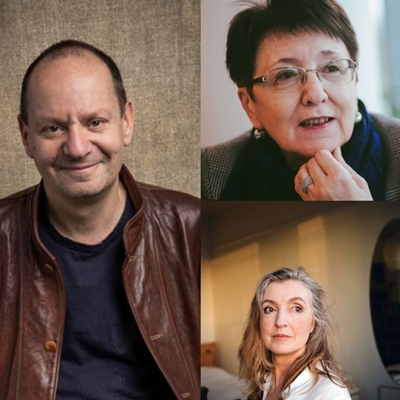
Event 17
Events taking place live online 5–9 October 2023
Babyn Yar: Listening to the Past
Read moreBabyn Yar, a ravine in the Ukrainian capital Kyiv, was the site of massacres carried out by Nazi Germany's forces during its campaign against the Soviet Union in World War II. On 29–30 September 1941 alone, some 33,771 Jews were killed. Other victims of massacres at the site included Soviet prisoners of war, communists and Romani people. An expert panel gathers to remember the tragedy and honour its victims.
Participants:
Dr. Paul Robert Magocsi (he will join remotely), Chair of Ukrainian Studies, University of Toronto; Board Member, Ukrainian Jewish Encounter (Toronto, Canada). Dr. Vladyslav Hrynevych, Senior Research Fellow at the Institute of Political and Ethnic Studies, National Academy of Sciences of Ukraine (Kyiv, Ukraine). Dr. Ihor Schupak, Director, Tkuma Ukrainian Institute for the Study of the Holocaust and of the Museum of Jewish Memory and the Holocaust; Board Member, Ukrainian Jewish Encounter (Dnipro, Ukraine). Dr. Yegor Vradiy, Assistant Director of the Tkuma Ukrainian Institute for the Study of the Holocaust and of the Museum of Jewish Memory and the Holocaust (Dnipro, Ukraine).
Moderator: Oksana Forostyna, Europe's Futures Fellow at the Institute for Human Sciences in Vienna (Kyiv, Ukraine).

Event 25
Events taking place live online 5–9 October 2023
Serhiy Hnyezdilov, Dmytro Khorkin, Lera Lauda, Natalia Lygachova, Vadym Miskyi, Svitlana Ostapa and Oleksandr Pedan
What will be the future of media in Ukraine?
Read moreThe Great War accelerated the change in media consumption habits of Ukrainians, and there will be no return to the pre-war state. However, the military media landscape will change immediately after the war. It will be influenced by technological, political, societal and global changes. The media will have a chance to increase influence, but not everyone will take advantage of this chance. At the same time, there is a risk that low-quality media will be among those who take advantage. At the discussion about the future of Ukrainian media, we will talk about communication with the young generation, hyperlocalization of media and players in this market, the future of radio and television, newly created state media. Together with our colleagues, we will outline the desired outlines of the post-war media landscape of Ukraine.
Event 18
Events taking place live online 5–9 October 2023
Yurko Prokhasko and Iryna Tsilyk, chaired by Olena Huseinova
And in the great new family, the family of the free… How do we create closeness in the conditions of war?
Read moreAs well as public and political life, conflict has a significant impact on peoples’ private lives. Families change, circles of friends decrease or expand, colleagues change, and even complete strangers can come to be extremely close.
Filmmaker Iryna Tsilyk and translator and essayist Yurko Prokhasko reflect on what relationships will be like after the war. Chaired by poet Olena Huseinova.
In partnership with Radio Culture
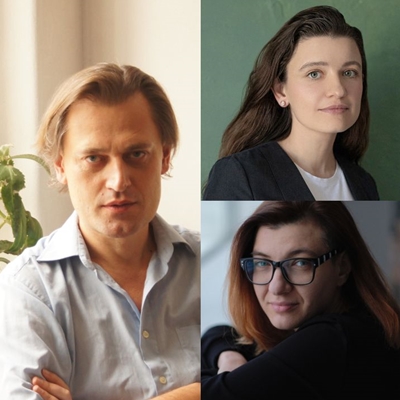
Event 19
Events taking place live online 5–9 October 2023
Sofia Cheliak, Oleksandra Matviichuk (digital) and Tetyana Teren, chaired by Christina Lamb
Women, war, and justice: in memory of Victoria Amelina
Read moreVictoria Amelina was a novelist, essayist and poet, and a friend of the festival, who died following a Russian missile attack in June 2023. After the invasion of Ukraine by Russia, Amelina trained as a war crimes researcher, travelling to areas liberated from Russian occupation and listening to and recording the testimonies of witnesses and survivors.
In memory of Amelina, PEN Ukraine’s executive director Tetyana Teren, program director of Lviv BookForum Sofia Cheliak and human rights lawyer Oleksandra Matviichuk talk to journalist Christina Lamb about Ukrainian women’s fight for justice. They share their future vision of the country, how victory for Ukraine will not happen without just punishment for war criminals, and why women need to be at the centre of it all.
Oleksandra Matviichuk will join remotely

Event 20
Events taking place live online 5–9 October 2023
Ed Vulliamy, Catalina Gómez Ángel, Kateryna Mikhalitsyna and Pavlo Vyshebaba in conversation with David Rieff
Resilience and Trauma at a time of war
Read moreJournalist and writer Ed Vulliamy, poet Pavlo Vyshebaba, writer, translator and artist Kateryna Mikhalitsyna and television presenter Catalina Gómez Ángel discuss what it is that makes people save rather than run away, and where the breaking point is in times of conflict. They also speak about psychological resilience versus breakdown in the face of the trauma of the war. Chaired by David Rieff.
Closed captions are available for this event in English and Spanish. Click on the "cc" icon in the video frame to select.

Event 21
Events taking place live online 5–9 October 2023
Kateryna Lykhohliad, Kateryna Mikhalitsyna, Iryna Novitska and Olena Rybka, chaired by Tetyana Teren
Occupation diaries. In memory of Volodymyr Vakulenko
Read morePresentation of the book by Volodymyr Vakulenko-K. I'm turning..., which included the occupation diary the writer kept in February-March 2022 and his selected poems. The book will be published by Vivat publishing house.
Diary of Volodymyr Vakulenko-K. – painful and truthful records that contained his thoughts and observations from the beginning of the full-scale invasion and during the occupation of Izyum and his native village of Kapitolivka in the Kharkiv region. Until the abduction by the Rashists, the inevitability of which he was aware, as well as the fact that he had little chance of survival - because he is Ukrainian because he is a volunteer, and activist because he has dignity. The day before the abduction, Volodymyr buried the diary under a cherry tree in his yard, telling his father: "When ours come, give it to them." What is it like to live under occupation? What do people become? What opens before the eyes and in the heart?

Event 24
Events taking place live online 5–9 October 2023
Armando Iannucci (digital), David Schneider (digital) and Nastia Zukhvala, chaired by Oleksandha Hontar
I would laugh to keep from crying: humor and trauma
Read moreAt the beginning of the full-scale invasion of Russia on the territory of Ukraine, the whole world laughed at the memes and jokes that Ukrainians generated about any situation in leading shows. The ability to laugh while being in the epicenter of tragedy was fascinating.
Does laughter really help you get over trauma, what comedians can joke about, and who can joke about a traumatic experience?
Armando Ianucci and David Schneider will join remotely

Event 23
Events taking place live online 5–9 October 2023
Oleksandr Mykhed and Art Spiegelman in conversation (digital live event)
Read moreArt Spiegelman’s Maus is the story of Vladek Spiegelman, a Jewish survivor of Hitler's Europe, and his son, a cartoonist coming to terms with his father's story. Vladek’s story of survival – told through the diminutive where the Nazis are cats and the Jews are mice – is woven into the author's account of his tortured relationship with his ageing father.
First published in a collected volume in 1986, the comics changed the way graphic novels were seen, showing audiences and critics that the form could be used to explore complex aesthetic, moral, and cultural themes. When Spiegelman published the book’s second volume, subtitled And Here My Troubles Began, the two-volume work was awarded a special Pulitzer Prize; it remains the only graphic novel to have ever won a Pulitzer.
Spiegelman (he will join remotely) will be in conversation with writer, curator of art projects and literary scholar Oleksandr Mykhed about his life and work.
Closed captions are available for this event in English and Spanish. Click on the "cc" icon in the video frame to select.

